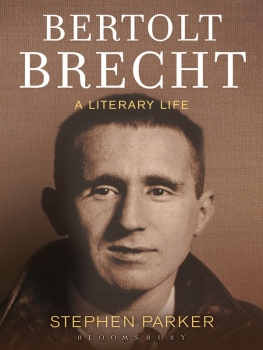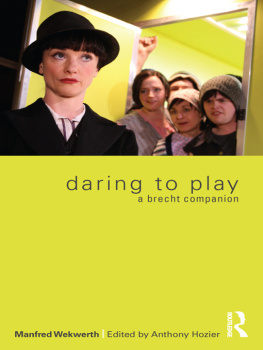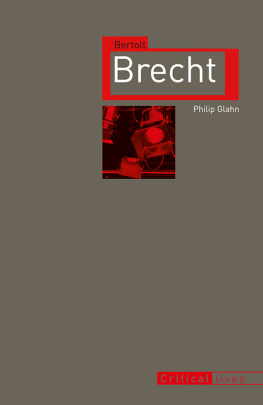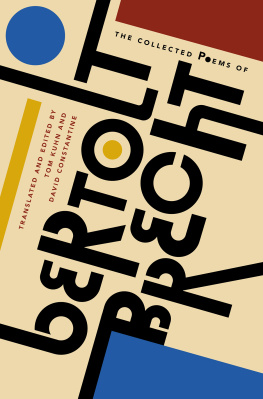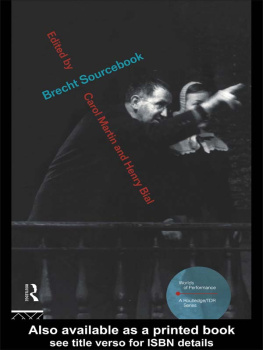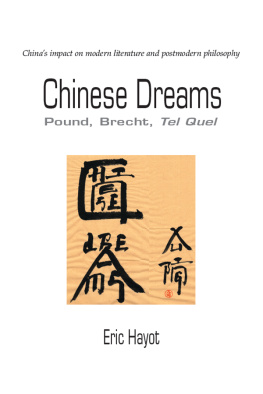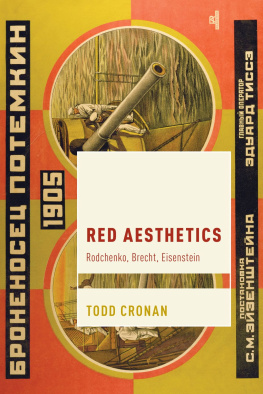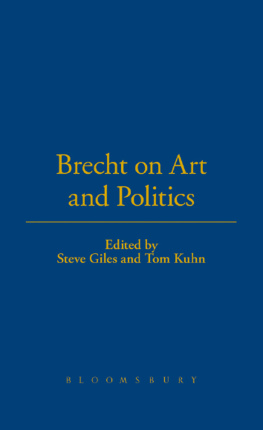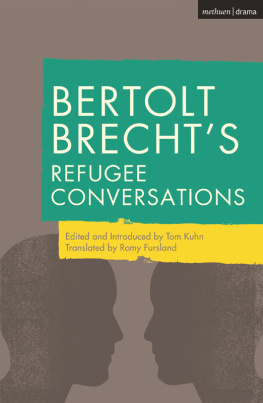Bertolt Brecht
Baal grew up within the whiteness of the womb
With the sky already large and pale and calm
Naked, young, endlessly marvellous
And Baal loved it when he came to us.
Bertolt Brecht, Hymn of Baal the Great
As the thinking man was overtaken by a great storm,
he was sitting in a big car and took up a lot of space.
The first thing he did was to get out of his car. The
second was to take off his jacket. The third was to
lie down on the ground. Thus reduced to his smallest
magnitude he withstood the storm.
Bertolt Brecht, Stories of Herr Keuner
Bertolt Brecht
A Literary Life
Stephen Parker

Stephen Parker is Henry Simon Professor of German at the University of Manchester and was Leverhulme Research Fellow, 200912. His publications include Sinn und Form: The Anatomy of a Literary Journal, with Matthew Philpotts (2009), The Modern Restoration: Re-thinking German Literature 19301960, with Peter Davies and Matthew Philpotts (2004), and Peter Huchel: A Literary Life in 20th-Century Germany (1998). He contributed to Brecht on Art and Politics (2003).
Contents
The material base for a study of Bertolt Brechts life and work, already remarkably rich, has been transformed since the end of the Cold War. Alongside the publication of the 30-volume Berliner und Frankfurter Ausgabe, Werner Hecht has compiled a vast chronicle of Brechts life and Jan Knopf has edited a five-volume Brecht handbook, with authoritative contributions from a team of leading scholars. The biographies of the women with whom Brecht had long-term working and sexual relationships principally Sabine Kebir on Helene Weigel, Elisabeth Hauptmann and Ruth Berlau, Hartmut Reiber on Margarete Steffin have greatly enriched our understanding. Among other recent works, Erdmut Wizislas account of Brechts relationship with Walter Benjamin made available in English by Nicholas Jacobss Libris and Jrgen Hillesheims study of the young Brechts aesthetics stand out, as do Ronald Speirss essays in the Brecht Yearbook and John Whites study of Brechts dramatic theory. I have benefited greatly from this formidable body of scholarship and from the opportunity to read the manuscript of one of the latest additions to it, David Barnetts history of the Berliner Ensemble. David has kindly allowed me to cite archival material not yet in the public sphere
The two archives in Germany dedicated to Brechts life and work, the Bertolt Brecht Archive in Berlin and the Bertolt Brecht Research Centre in Augsburg, have been indispensable. At the latter, I have enjoyed the support and advice of Helmut Gier and Jrgen Hillesheim, at the former of Erdmut Wizisla and his staff, particularly Dorothee Aders, Iliane Thiemann, Anett Schubotz and Helgrid Streidt. I have also drawn upon archival material from the following: Akademie der Knste, Berlin; Bundesarchiv, Berlin; and Deutsches Literaturarchiv, Marbach am Neckar. I should like to thank the staff from these institutions for their help.
Brecht in English has long been synonymous with Bloomsburys extensive list in its Methuen Drama imprint, which was developed with great energy and scholarly innovation over many years under the founding general editor, John Willett. I am delighted that, thanks to the present general editor Tom Kuhn and Bloomsburys Senior Commissioning Editor Mark Dudgeon, this first English-language biography of Brecht in two decades is appearing with Methuen Drama. I have, of course, used Methuens translations whenever possible. Where translations are not available, I have used my own except for Sabine Berendse and Paul Clementss excellent, forthcoming translation of the conversations which Sabines father Hans Bunge conducted with Brechts friend Hanns Eisler. Mark Dudgeon has been a superb editor, mediating relations with the Brecht Estate and providing judicious advice at all stages in the projects development. I have been extremely fortunate, too, with my principal readers, Henry Phillips, Ronald Speirs, Peter Thomson and Tom Kuhn. Their enormous acumen and experience relating not only to Brecht but to literary and theatre studies in general have not only added a great deal of specialist knowledge but have helped me to navigate some difficult terrain. I am hugely indebted to Henry, Ron, Peter and Tom. This is not an official biography. However, I should like to thank Brechts daughter, Barbara Brecht-Schall, for reading the manuscript, giving advice and, together with the Suhrkamp Verlag, granting permission for the use of quotations. Others have kindly commented on drafts: David Barnett, Sabine Berendse, Steve Giles, Matthew Philpotts, my son Fred and my daughter Cara, who has also supplied the index and helped in the selection of photographs, Nick Foulds, Steve Hall, Geoff Carter and, from the perspective of a medical practitioner, Dave Gilbert. Wolfgang Frhwald, Martin Durrell, Ritchie Robertson, Ian Kershaw, Hans Ulrich Gumbrecht and John White gave strong support and encouragement at the outset. A particular delight was seeing Brechts house of exile in Svendborg, Denmark, beautifully restored by the town council, which one of its trustees, Joergen Lehrmann Madsen, kindly showed me round.
The Brecht Archive kindly supplied photographs. I should like to thank the following rights holders for granting permission to use photographs: ullstein bild Zander & Labisch for photograph 10; Chris Drinkwater for 11; the Brecht Archive for 19, 1217, 20, 22, 24 and 25; Hilda Hoffmann for 18, 19 and 21; and, Suhrkamp Verlag for 23 and 26. Quotations are reprinted by permission of the publisher from Walter Benjamin, Selected Writings, Cambridge, Mass: The Belknap Press of Harvard University Press, Copyright 1999 and 2002 by the President and Fellows of Harvard College, as follows: volume 2, 192734, translated by Rodney Livingstone, and Others, edited by Michael W. Jennings, Howard Eiland and Gary Smith, pp. 7846 and p. 789; and, volume 3, 19358, translated by Edmund Jepcott, Howard Eiland, and Others, edited by Howard Eiland and Michael W. Jennings, p. 337.
This study could not have been written without the Major Research Fellowship which the Leverhulme Trust awarded me in 200912. I should like to thank Leverhulme for its generous support and the University of Manchester for enabling me to complete the work without interruption by drawing on accumulated study leave. Maj-Britt and Victor, Cara and Fred, have had the pleasure of listening to my ideas as they have developed. This book is dedicated to my mother, Mary, and my late father, Bob.
Stephen Parker, Manchester
June 2013
The cataclysmic events which twice engulfed Europe and much of the planet in war and mass suffering during the dark times of the early to mid-twentieth century still cast an ominous shadow upon our world. Meanwhile, in the theatres of war the killing goes on. That would not have surprised the subject of this study, Bertolt Brecht (18981956), a trenchant opponent of war, whose play Brecht explained that he and his friends had
treated the subject of insensitivity, coming out of a great war, quite personally. How could one become insensitive? The difficulty, not immediately apparent, was that society, awakening in us the wish to be insensitive, simultaneously made productivity (not only in the artistic sphere) dependent on sensitivity , i.e. the productive person had to pay the price of vulnerability.
Out of that predicament shared with a generation damaged by war, in the 1920s Brecht created works notorious for their aggressive, amoral cynicism which have come to define our image of the young Brecht. Surprisingly for an artist of such iconic standing, the sensitivity and vulnerability which Brecht and his friends felt compelled to cover with a skein of insensitivity have received much less attention. Brechts own evolving attitude towards the self, which assumed ever more self-effacing, impersonal forms, obscured the issue, as did the ideological prism through which critics generally viewed Brecht following his espousal of Marxism amidst the contested belief systems of the twentieth century. As a result, our understanding of Brecht as the artist which beyond all things he supremely was has remained strikingly impoverished.
Next page
